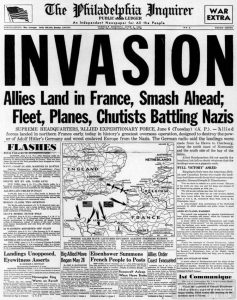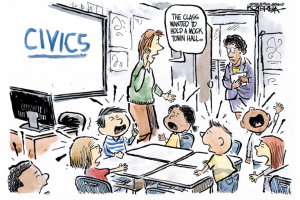This content was originally posted in The Times Record as “A Civics Test to Graduate High School? Absolutely” and has been reposted with the author’s permission.
It was an inspiring lecture. One of my finest. And then, I brought up D-Day.
Spend enough time in the classroom and you learn to read students’ faces. They say so much.
“I’m bored.” “I’m thinking about something else.” “I just broke up with my girlfriend.” I’m homesick.” “I’m hungry.” And, of course, “I have no idea what you’re talking about.”
The latter – along with the unmistakable sound of crickets – was the reaction to my mention of the day Allied forces invaded Europe in 1944.
This particular encounter with students took place several years ago at another university but I haven’t forgotten it. It went something like this.
“So, on D-Day….”
Nothing.
“Does everyone know what D-Day is?”
Still nothing. Not one hand in the air.
“The invasion of Europe by the Allies?”
Blank stares. “Anyone? Anyone?”
“How about World War II?”
“Oh, yeah!” one student exclaimed, as if we’d made some great breakthrough.
Those few moments in that classroom were indicative of a much broader and very disturbing issue – the appalling knowledge gap among young people about American history and America in general.
A study released earlier this month by the Woodrow Wilson National Fellowship Foundation showed that in a sample of 1,000 American adults, only 36 percent would pass a U.S. citizenship test. Those 65 and older who were surveyed scored the highest. But only 19 percent of those 45 and younger passed the test. Oh yeah, and 60 percent of those surveyed did not know which countries the U.S. fought against in World War II.
If you’re not terrified yet, consider that the questions on the test aren’t exactly what you would find on the Mensa admissions exam.
Here are a few actual questions on the citizenship test: What does the Constitution do? What is one right or freedom from the First Amendment? Name one branch or part of the government? Who makes federal laws?
You get the idea. Not a lot of heavy lifting.
And yet, at least if this study is any barometer, most Americans would fail a rudimentary U.S. civics test.
 This would seem to be a searing indictment of our public schools. How a student can graduate high school, not to mention college, knowing virtually nothing about a world war that claimed the lives of 418,500 Americans and 50 million others is stupefying.
This would seem to be a searing indictment of our public schools. How a student can graduate high school, not to mention college, knowing virtually nothing about a world war that claimed the lives of 418,500 Americans and 50 million others is stupefying.
But here we are.
Kentucky is the most recent state to require all high school seniors to pass a U.S. citizenship test to graduate. Students have to score a 60 on a 100-question test to pass. Kentucky is one of nine states that require students to pass a civics test to graduate high school.
Bravo.
It’s hard to imagine that anyone would object to such a basic requirement but alas, the naysayers are out there. Chief among the pooh poohers, of all things, is the National Council for the Social Studies whose tagline, ironically enough, reads “Preparing Students for College, Career, and Civic Life.”
‘While the Naturalization Test as presently constructed does assess a surface level of civic knowledge that may be quickly forgotten, it ignores the skills and dispositions component so necessary for true civic literacy and learning,” according to an NCSS position statement posted in March, 2018. “Indeed, rote knowledge of civics content does not equal understanding of what it means to be a citizen.”
And what does it mean to be a citizen? The NCSS advocates the teaching of civic education to include practices such as “News Media Literacy Education” or distinguishing “fake news from legitimate argument.” “Social and Emotional Learning” which “reflects the idea that we are best capable of engaging in civic life when we are our best selves.” “School Climate Reform” which includes addressing “inequitable relationships within schools.” And finally, “Action Civics,” or “engaging students in practicing the roles and responsibilities of citizenship by taking charge and making proposals and decisions that can have long-term consequences.”
I’m still not clear on exactly what “Action Civics” entails but it sounds deliberately vague and not-so-vaguely political. So, part of civic education should include teaching students to protest?
I’m not naïve enough to believe that passing a simple civics test to graduate high school is the remedy for the multi-leveled failure to teach our young people the basics of what it means to be an American. But it’s something.
I would argue that our elementary and secondary school students would be much better served learning about why America had to fight World War II instead of being taught hogwash such as “School Climate Reform” or “Action Civics.”
Every state should pass a law requiring high school students to pass a civics test to graduate. The question, “Who knows about D-Day?” should never be met by unraised hands in any high school or college classroom. But it is. And that’s more than a failure. It’s a tragedy.
This post was authored by:



add ignorance with social media mind numbing and we are in for a serious problem. “let’s pray!”
Judy, I agree with you completely. I do pray for us all everyday that we will become more present with those around us and more aware of our past and what has been done by so many to keep us free and safe! Thanks for reading the blog and commenting! We hope you’ll continue to follow the progress of our movie 🙂
I couldn’t agree more. Overuse of social media is an epidemic which is why, in my classroom, electronic devices of all kinds are prohibited.
We’ve lost the ability to pay attention, to listen, to read, to engage. This, I’m afraid, is why the most important events in American history, such as the Allied invasion, are nothing more than a rumor to many young people.
I hope and pray this changes.